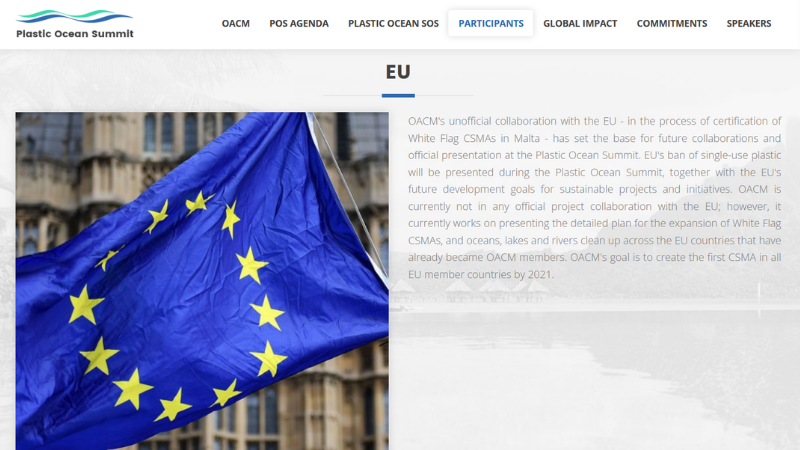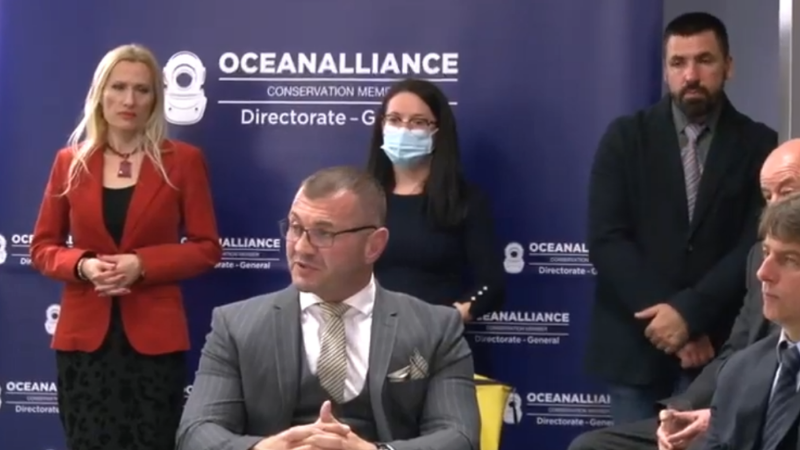A Croatian conman who The Shift had exposed as having scammed €200,000 in sponsorship money from the government and from several corporate sponsors for clean-up projects that failed to achieve promised goals has now taken his White Flag project to the international stage.
Kristijan Curavić’s White Flag project, which is run through an organisation known as OACM, resurfaced in Croatian media reports that were promoting the initiative with the support of both former and current members of the Croatian government.
The Croatian authorities’ support for Curavić’s efforts departed from their approach in January 2019, when the municipal state attorney’s office had filed a court case against him for issuing a false invoice for a trip that never happened.
OACM is now promoting a ‘Plastic Ocean Summit’, an event being marketed as having received financial support from the United Arab Emirates (UAE) government, to host an “environmental tourism industry summit” in the country on 15 November. Croatian press reports also refer to a similar summit to be held in Croatia on 26 May.
The government only broke its silence on the fraudulent White Flag project and admitted it had terminated its relationship with Curavić’s organisation after The Shift’s investigation.
The White Flag project was raking in €25,000 – €30,000 for every beach it “certified” as plastic-free, often with an official “inauguration” in which high-ranking government officials such as former Gozo minister Justyne Caruana and former environment minister Jose’ Herrera would speak about the project’s nonexistent value.
In reality, plastic was washing up on beaches certified with Curavić’s white flags just hours after the clean-ups and certification ceremonies were held. Herrera in particular failed to account for why no one saw through the obvious fact that one clean-up and a ceremony were not enough to ensure plastic-free beaches.
OACM’s Plastic Ocean Summit website specifically refers to its past “unofficial collaboration with the EU”, a reference to how “the process of certification of White Flag CSMAs in Malta” has “set the base for future collaborations”.

Plastic Ocean Summit promotional material.
Malta was not the first to fall prey to Curavić’s tendency to use false endorsements. In December 2018, The Prince Albert II of Monaco Foundation, which Curavić’s organisation formerly claimed as one of the project’s “partners,” issued legal threats while denying any association with the White Flag project.
The embarrassment suffered by the Maltese government after having forked out hundreds of thousands of euros on a scam served as a timely warning to the government of the Seychelles islands, which officially announced in August 2019 that it had cancelled plans to fund 40 White Flag beaches, citing The Shift’s reporting in its decision.
“Several articles on The Shift – a digital newspaper dedicated to investigative journalism based in Malta – reported the allegations against OACM and Curavić,” the Seychelles’ government statement read. “The articles also reported that Curavić is also using logos of supposed partners when in reality there is no partnership. One such is the Prince Albert II of Monaco Foundation.”
In line with its approach in Malta, OACM is using several high-profile names to bolster its air of credibility, including referring to former UN World Tourism Organisation secretary-general Taleb Rifai as one of its “board members” in spite of the fact that Rifai does not seem to have listed OACM on his public LinkedIn profile. Questions have been sent to a firm which Rifai listed as a main contact to confirm whether he is actually involved in the project.
Other board members who did show up by Curavić’s side in promotional footage include former Croatian president Stjepan Mesić. In 2015, Mesić was named as an official who was offered a €1.6 million bribe to expedite a sale of armed vehicles in 2007.
While the court judgement stated that Mesić and another individual who was the director of Croatia’s state-owned arms and vehicles company did accept the bribe, Mesić denied even knowing the individuals who were charged with offering the bribe, and claimed he was being set up.
Curavić had accused The Shift of reputational damage after its investigation into the White Flag scam and had sent legal threats demanding €300,000 in compensation and a public apology, including demands to correct “false allegations”. The Shift refuted all claims made in the letter, pointing out that documentary evidence was available to support these reports.













